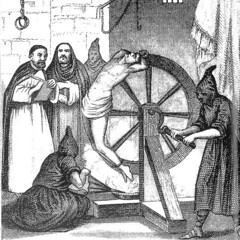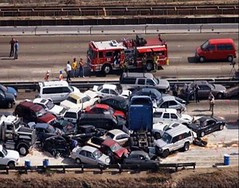"Today's new toll road 'innovative financing' schemes are a colossal taxpayer rip-off that will price most Texans off their own public roads..."

6/13/09
Terri Hall
San Antonio Express-News
Copyright 2009
Here's the short list of reasons why toll road policy under Rick Perry has caused a grassroots revolt: higher taxes, greater bureaucracy, and corporatism.
When I first learned that TxDOT planned to turn US 281, a freeway already built and paid for, into a tollway, it smelled like a DOUBLE TAX rip-off from the start. My fellow Texans felt the same way and a Texas-sized taxpayer revolt quickly ensued. Then when Perry's agenda to sell-off Texas highways to foreign corporations spread like a canker, it was like throwing gasoline on the fire and the grassroots exploded.
Runaway taxation without accountability
Tolls mean higher transportation taxes...more like runaway taxation and it's taxation without representation since unelected bureaucrats are making these multi-generational, multi-billion dollar tax decisions. This set-up is by design so politicians can blame bureaucrats for the tax increases and, ultimately, for their own failures.
We're told there's no money to build roads, yet last I checked, we still pay gas tax every time we fill-up at the pump. So what's the real story?
- When nearly HALF of our gas taxes are siphoned-off for things that have nothing to do with transportation, herein lies a HUGE part of the problem.
- Second, the money that does make it into TxDOT's coffers gets squandered on taxpayer-funded lobbying and ad campaigns or is used to prop-up toll projects that aren't even self-sustaining or financially viable.
- Third, politicians, like Perry, have been paid millions in campaign contributions by the highway lobby to push for the most expensive transportation tax: privatized toll roads.
Simple non-toll solutions
Our politicians know the solution to this problem:
- Quit cannibalizing the gas tax (end the diversions!)
- Cut the waste and prioritize spending, including a top-to-bottom independent audit of TxDOT's books
- Make TxDOT directly accountable to the taxpayers through elected leadership
- Then if found necessary, raise the statewide gas tax.
Why they have failed to do ALL of the above is pure politics. Virtually every public opinion poll consistently shows massive opposition (as high as 80-90%) to gas tax increases. Politicians have been trained to think ANY increase in the gas tax is political suicide. The sale of Texas highways to foreign corporations in 50 year sweetheart deals certainly is as well! When taxpayers are actually given the choice between funding our public highways through gas taxes versus tolls, they will choose the cheapest solution: gas taxes, hands down.
Gas tax cheapest, fairest way to fund roads
We currently pay a penny a mile in state gas taxes today, or about 2 cents a mile on average when you add in federal gas taxes. Toll rates start at 25 cents a mile and 30% off the top goes to bureaucracy just to collect the tax (it perpetuates the same problem as gas tax diversions when 30% of the money gets eaten-up off the top). On deals being contemplated in Dallas and Ft. Worth, that cost balloons to 75 cents a mile when private companies like Spain-based Cintra seek to takeover our public highways.
That's $3,000 a year in new toll taxes to get to work versus $100 a year if the Legislature raised the statewide gas tax 10 cents. It's a no-brainer. Gas tax is the CHEAPEST way to fund our public roadways.
Corporatism, big government & big business team-up to steal our money
As you can see, the MOST expensive way to fund roads is privatization where politicians sell off our public highways, our lifelines for daily living, to private corporations. Many call it corporatism, others call them sweetheart deals, but Mussolini called it fascism. It's the marriage of the corporation with the state. Fiscally speaking, it's like taking out a second mortgage on our highway system. These deals are known as Public Private Partnerships (PPPs) or Comprehensive Development Agreements (CDAs) in Texas.
This trend has spread like a cancer across the country, with more than half the states adopting laws to allow PPPs. To call them sweetheart deals is no exaggeration. They include non-compete agreements that forbid or financially penalize the highway department for building any "competing" free roads surrounding the toll road (ensuring congestion on the free lanes), guaranteed profits for a half century at a time, massive public subsidies (resulting in double and triple taxation), and multi-generational debt.
Read more here.
To sum it up...gone are the days of traditional turnpikes that were brand new roads, where the people got to vote on them, the money and control stayed with the PEOPLE, and the tolls would cease when the road was paid for. Today's new toll road "innovative financing" schemes are a colossal taxpayer rip-off that will price most Texans off their own public roads or suffer the doom of gridlock for generations. Join the revolution at www.TexasTURF.org.© 2009 San Antonio Express-News: www.voices.mysanantonio.com
To search TTC News Archives click
To view the Trans-Texas Corridor Blog click














